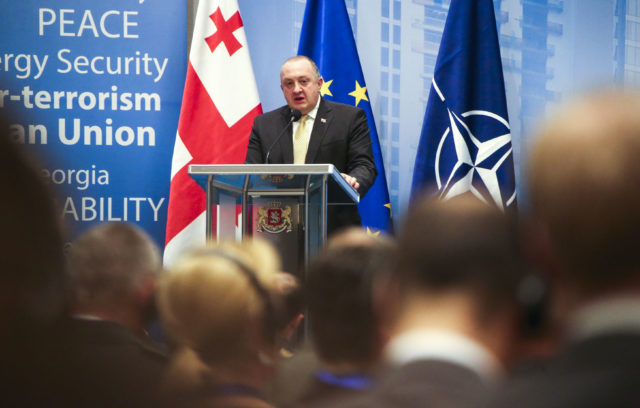
Georgian President Calls for a United Western Strategy Against Russian Aggression
Publication: Eurasia Daily Monitor Volume: 14 Issue: 132
By:

The Georgian seaport city of Batumi hosted the eleventh annual Georgia Defense and Security Conference (GDSC), on October 12. The event was attended by Georgian President Giorgi Margvelashvili, Prime Minister Giorgi Kvirikashvili, Parliamentary Speaker Irakli Kobakhidze, as well as a number of high-ranking government officials, military officers and security experts, primarily from Western countries. Georgian leaders emphasized their country’s commitment to Euro-Atlantic integration. Moreover, they elaborated the national security threats their country faces as a result of Russian occupation of Georgian regions of Abkhazia and South Ossetia (Tskhinvali Region) in addition to the Kremlin’s other aggressive activities (Gdsc.mod.gov.ge, Channel One TV, October 12).
The conference’s main highlight, however, was the Georgian president’s call to the international community to formulate a united strategy against Russia’s increasingly effective and sophisticated subversion and interference in the affairs of not only post-Soviet countries, but also of Western democracies. As Margvelashvili underscored, the threat of the world being divided into spheres of privileged interests is real not only for Russia’s neighbors, but also globally. He further regretted that a united approach to counter such a threat has so far failed to materialize (Civil Georgia, October 12).
In his speech, President Margvelashvili provided no details to buttress his far-reaching proposal (President.gov.ge, October 12). Thus, the first question arising from his remarks is whether such a united strategy and joint action are feasible at all. Certainly, in 2008, many in the West were willing to characterize the Russian invasion of Georgia as an isolated case, whereby Russia was punishing an “unruly” Georgia; and some Western friends even blamed Tbilisi for “provoking” the war with Moscow. However, the Russian annexation of Crimea in 2014, the subsequent war in eastern Ukraine, and Russia’s increasingly sophisticated examples of subversion of Western democracies’ electoral processes have forced a rethink even among Western apologists of the Kremlin’s true intentions and capabilities. Gradually, most countries in the West are now starting to take measures to ensure their cyber security, defend their national electoral institutions, and counter massive disinformation campaigns waged from obscure, yet highly sophisticated, multiple news sources (see EDM, June 20). Nevertheless, the Western response to Russian aggression and subversion is still weak, mainly due to a lack of political will among political elites, disunity within the political establishments (often engineered and encouraged by Moscow), and the failure to fully understand the true scope of the Russian threat (Civil Georgia, July 25). Needless to say, the West still has some distance to go before it can take concrete steps to form a unified strategy for countering Russian meddling and subversion.
The second question is what a united strategy and a joint effort against Russian aggression could look like if it ever materializes. The West is already protected by a military alliance, the North Atlantic Treaty Organization (NATO), whose primary goal is the territorial defense of its allies. And in the face of Russian military buildup along its borders, NATO is taking some measures to deploy additional troops on its eastern frontiers (ERR, June 29). However, a joint strategy, like the type Margvelashvili was calling for, would also need to include NATO non-member countries: foremost Georgia and Ukraine (recent victims of Russian military aggression), and maybe others.
Against the background of prolonged military campaigns in Iraq and Afghanistan, the Western public might not be particularly enthusiastic about new military commitments in Eurasia. However, such a joint strategy would not necessarily require any increased military engagement, as the West has a number of other powerful points of leverage, first of all economic sanctions. Although Western sanctions against Russia following the 2008 invasion of Georgia fell apart within a couple of years, the ones imposed on Moscow after the annexation of Crimea endured. And considering that, since early 2015, Russia has not escalated its war against Ukraine nor succeeded in reasserting its political control over Kyiv, these sanctions look to be working—further aggression by Moscow appears to have been restrained (Euromaidan Press, February 10). Additionally, the creation of a joint Euro-Atlantic cyber security system, though a huge logistical undertaking, could be another possible measure to help countries under threat from Russia coordinate their defensive efforts. Similarly, expanding and deepening intelligence/information sharing would help the countries targeted by the Kremlin to react quickly and, in many cases, even take preemptive measures. Above all, supplying post-Soviet countries, especially Ukraine and Georgia, with anti-tank and anti-air weapons would asymmetrically limit Russia’s military dominance in the region.
Overall, President Margvelashvili’s call to the international community to form a joint strategy against Russian subversion, however bold, could in fact be implemented—if there is sufficient political will on both sides of the Atlantic to do so. Indeed, the Georgian political and especially foreign policy establishment has repeatedly exhibited a mixture of naivety, unrealistic expectations, and faulty understanding of the international political climate (see EDM, November 20, 2013; February 21, 2014). Nevertheless, President Margvelashvili’s recent proposal may be much more realistic, particularly since it comes at the very moment when the public mood in the West vis-à-vis Russia has grown dramatically more critical and Western governments are starting to take some concrete measures to counter Moscow’s policies. Though, as is often the case, this strategic proposal will be beholden to policymakers’ timely decisiveness and action.



